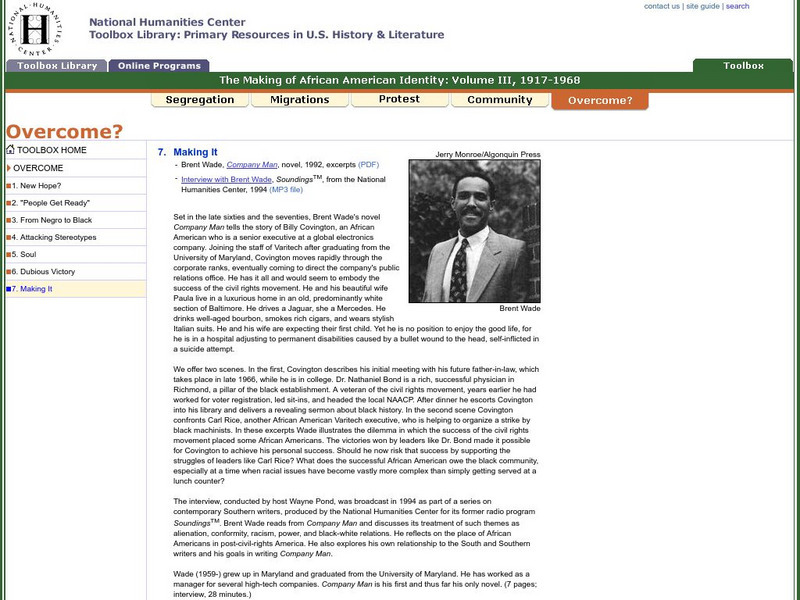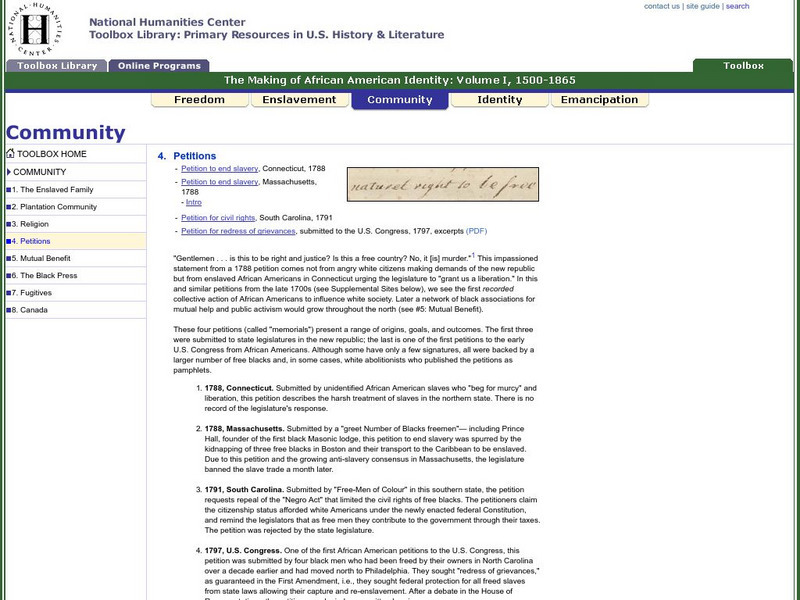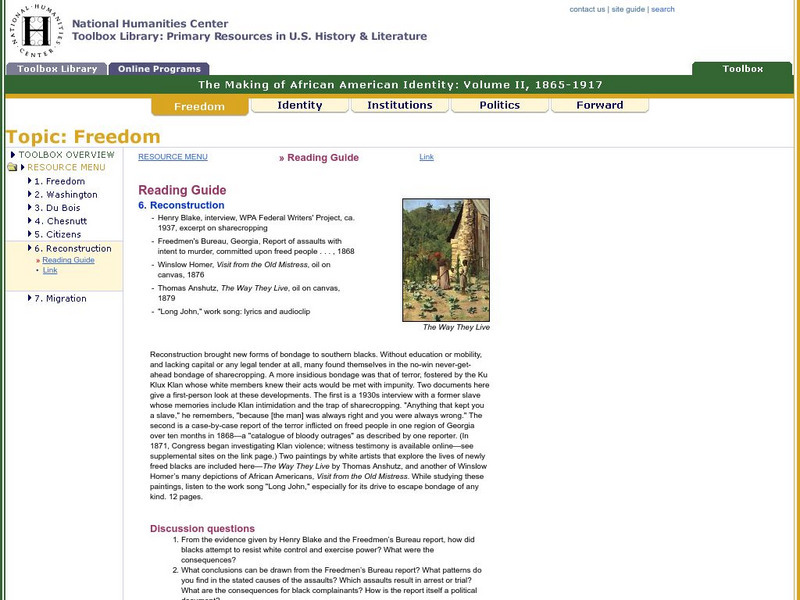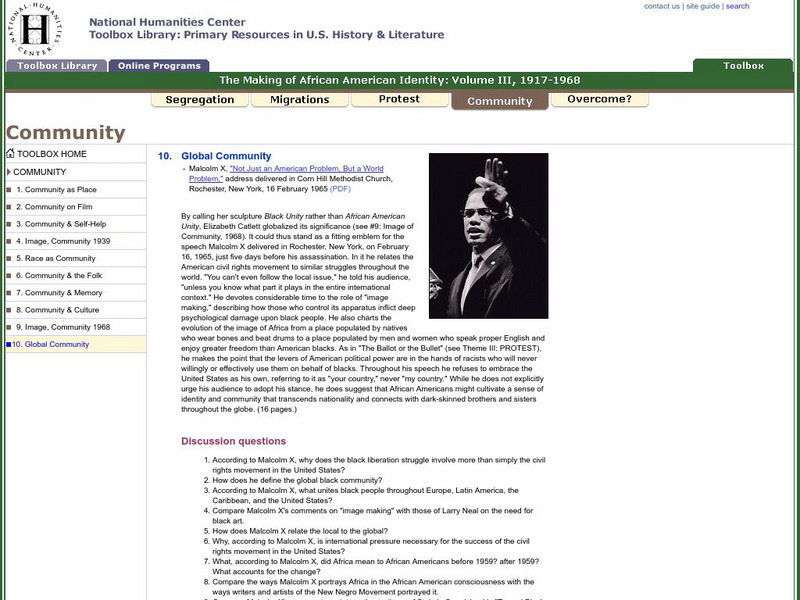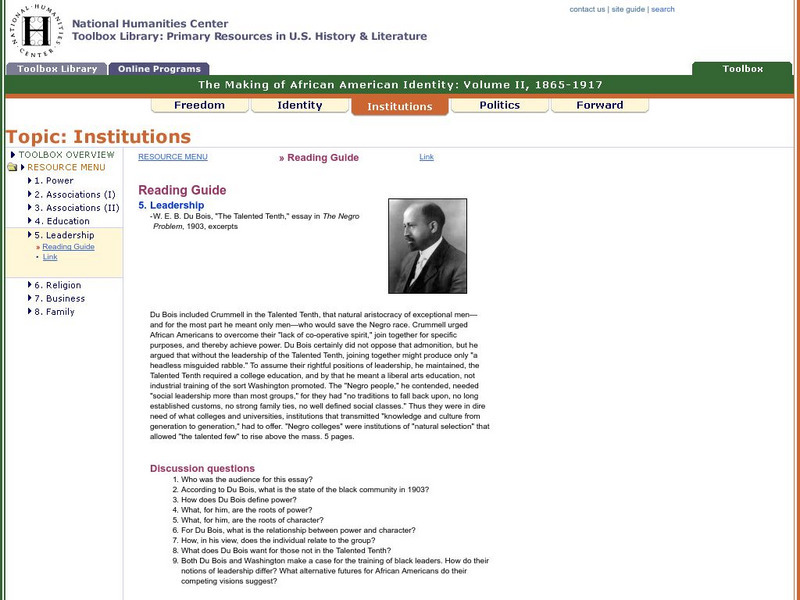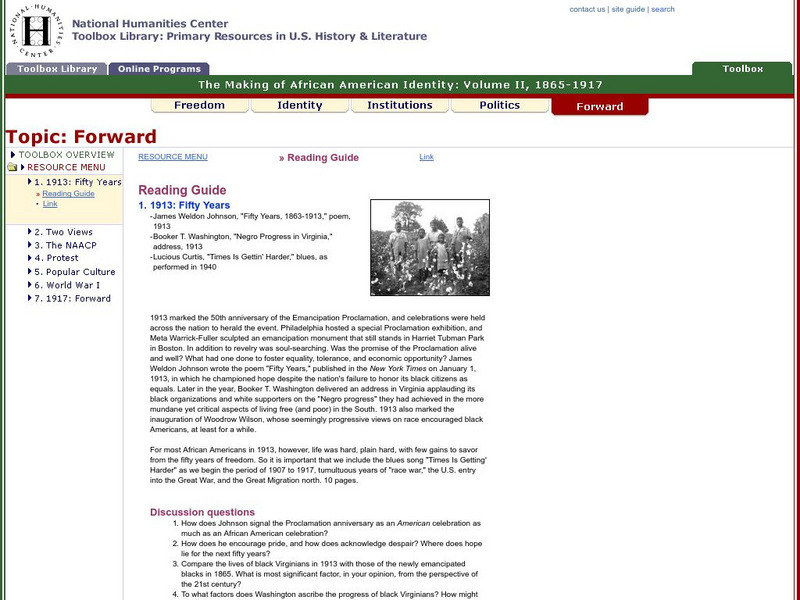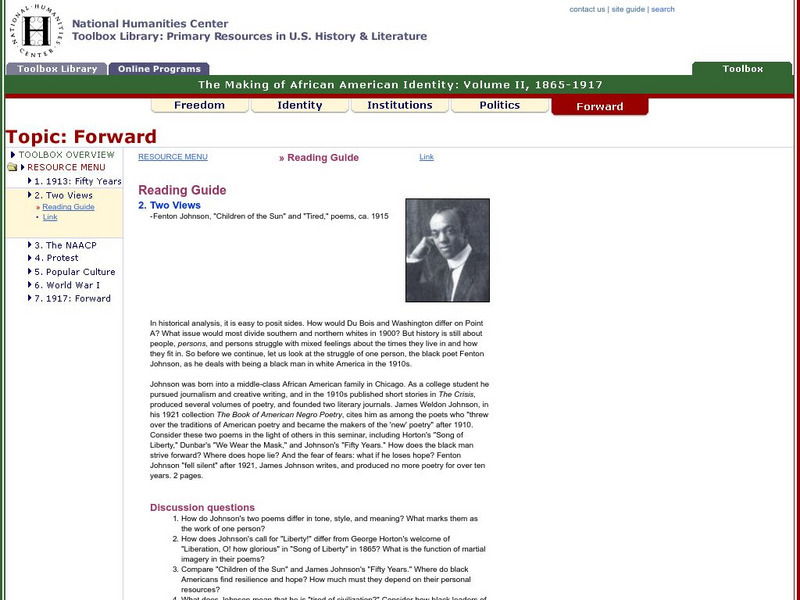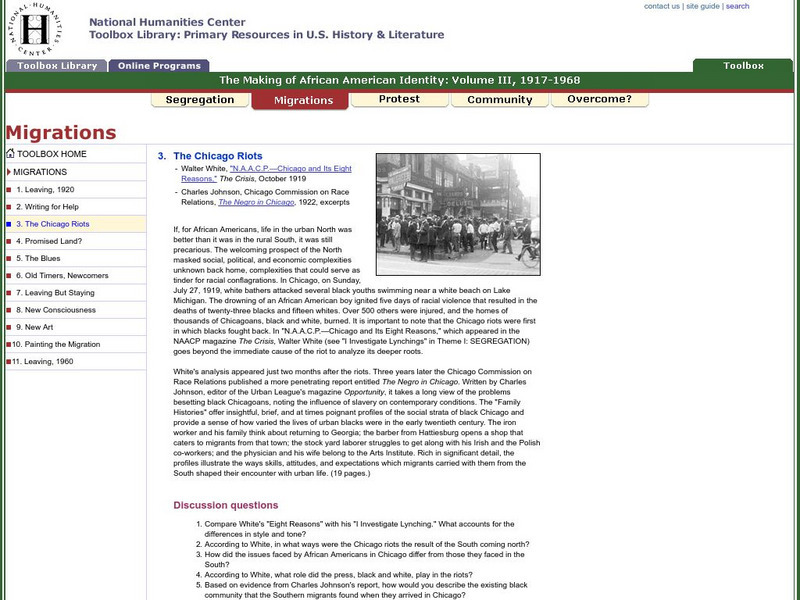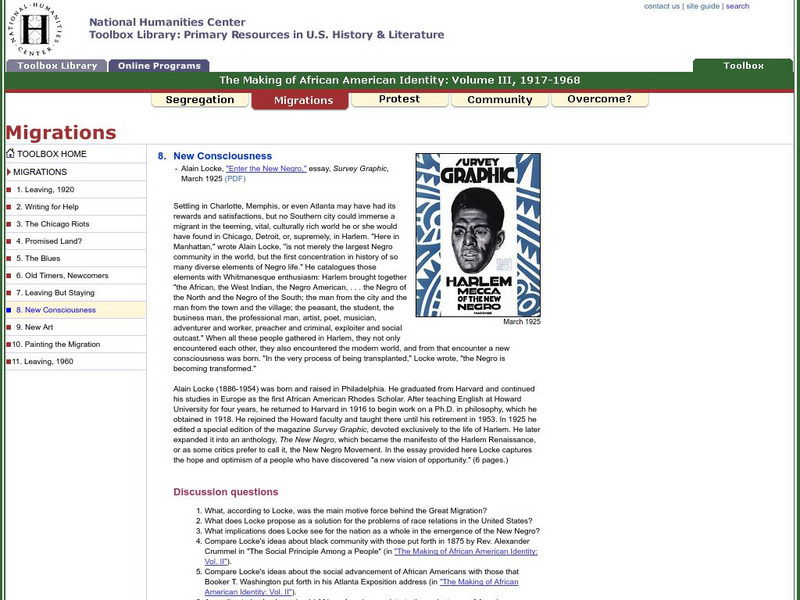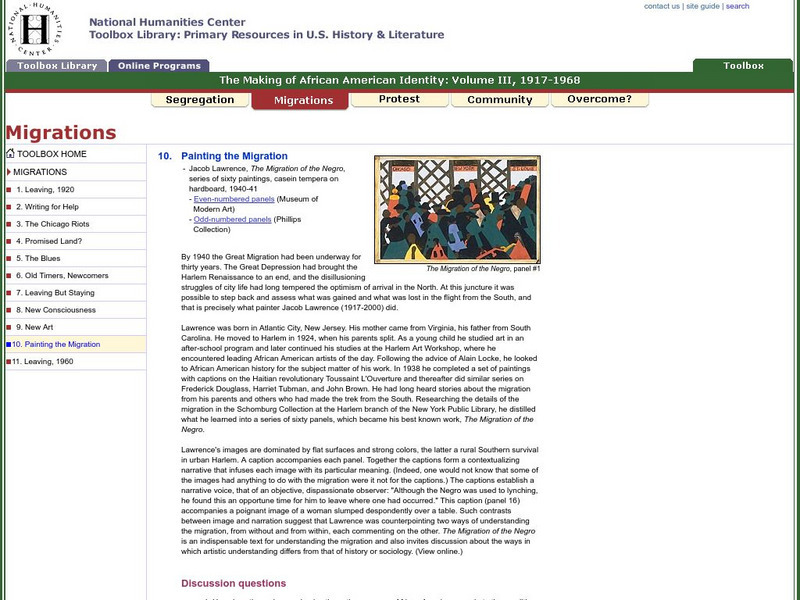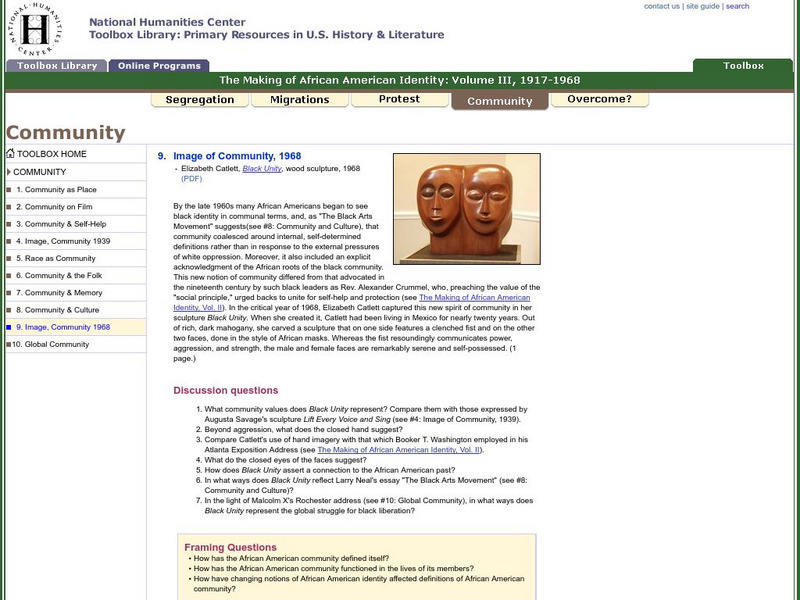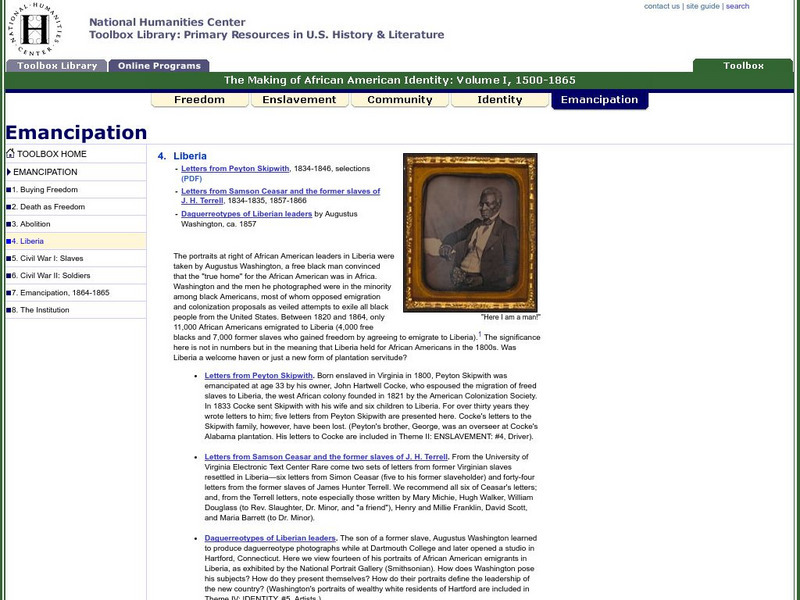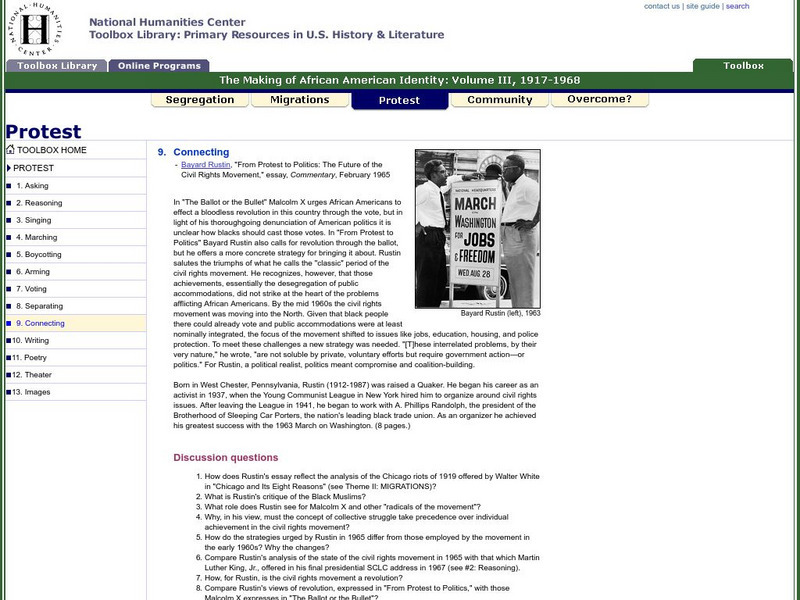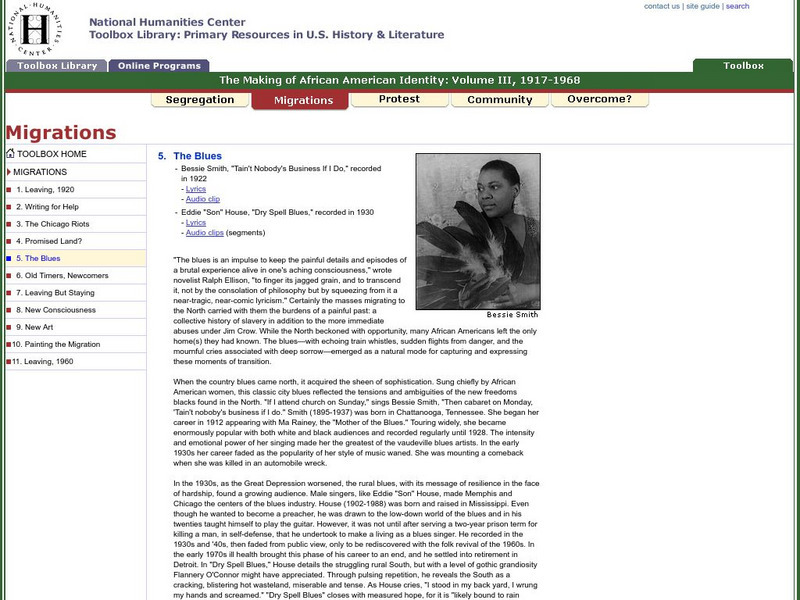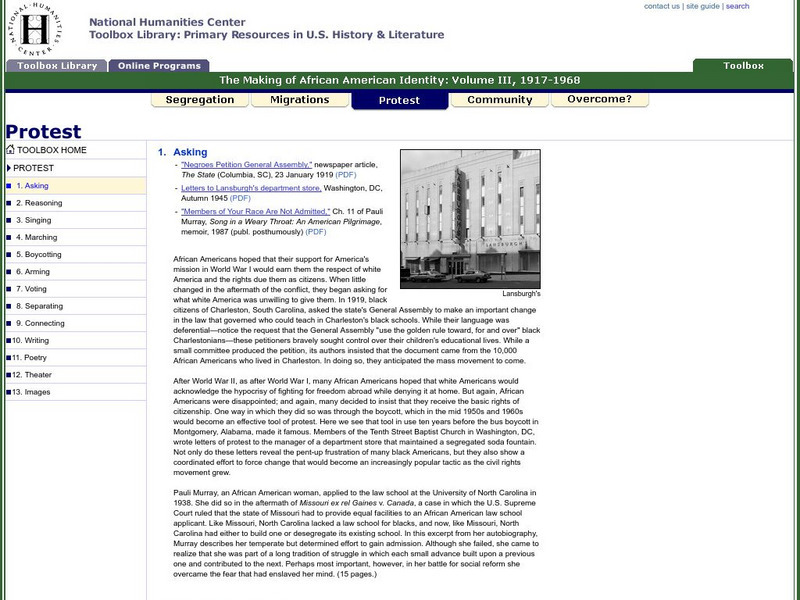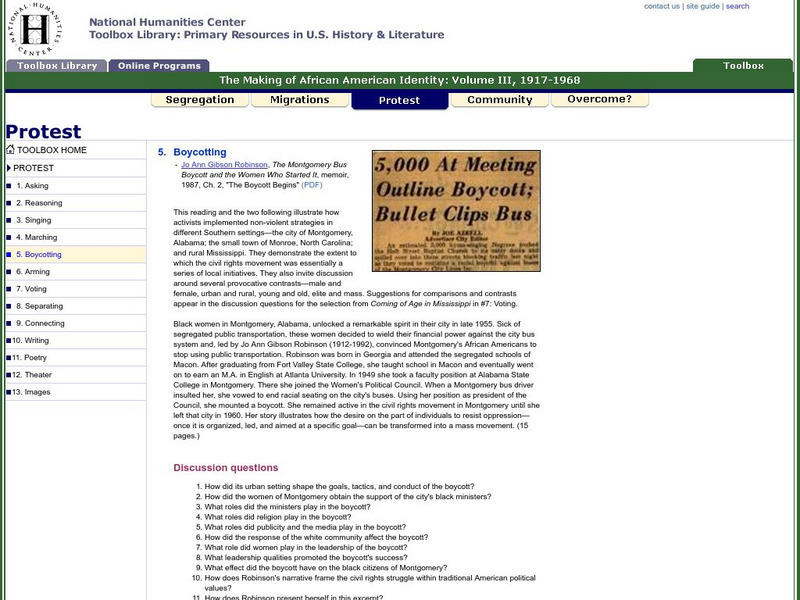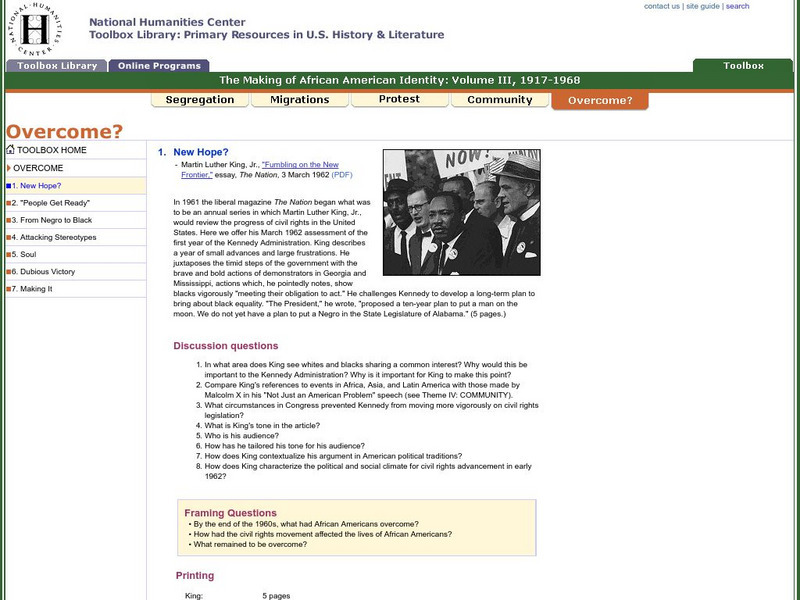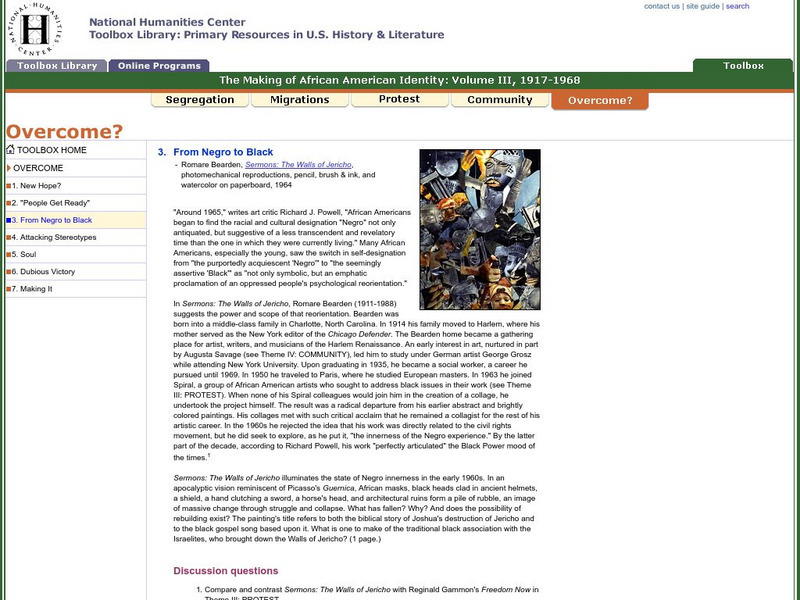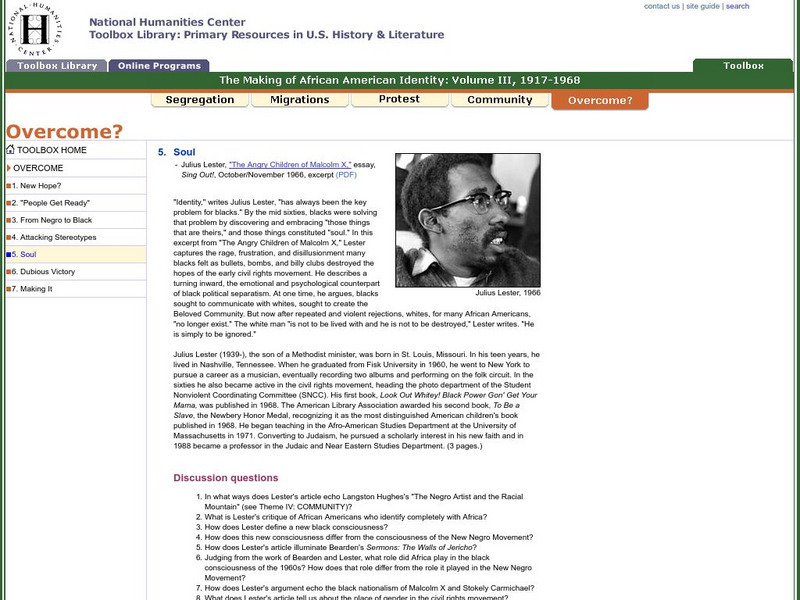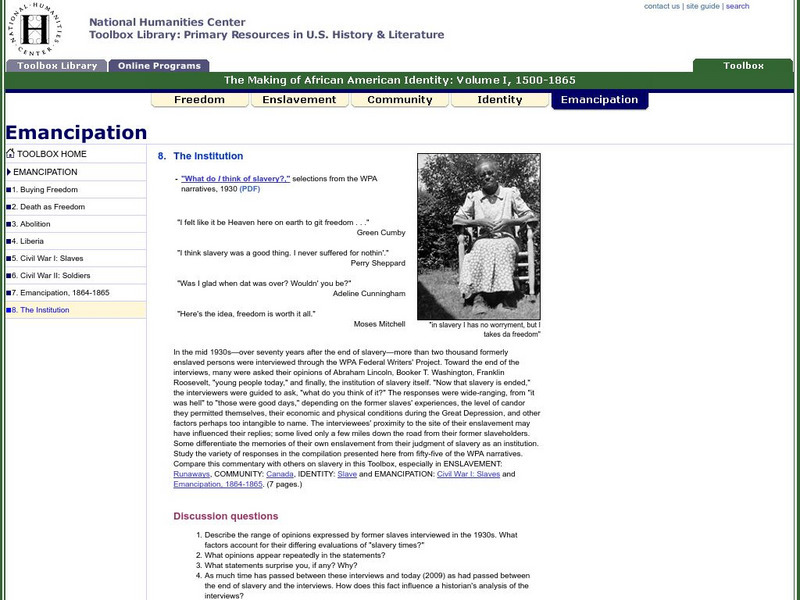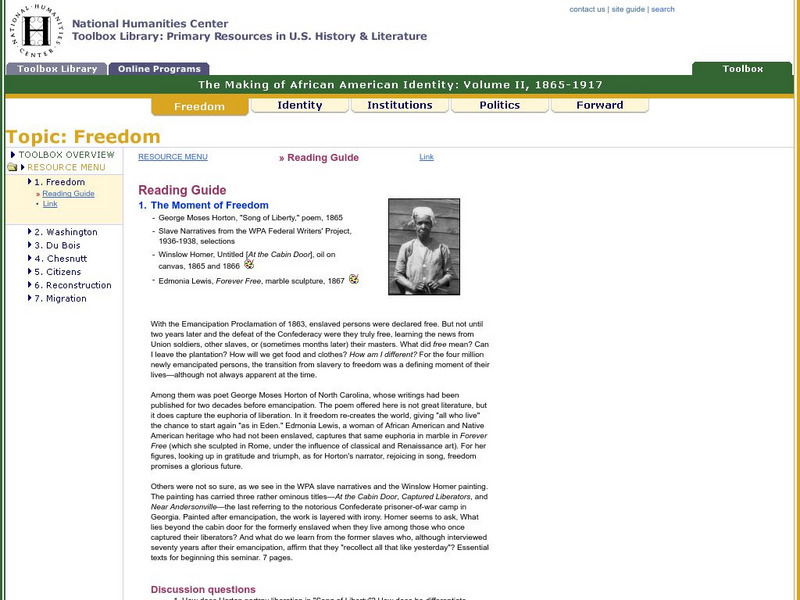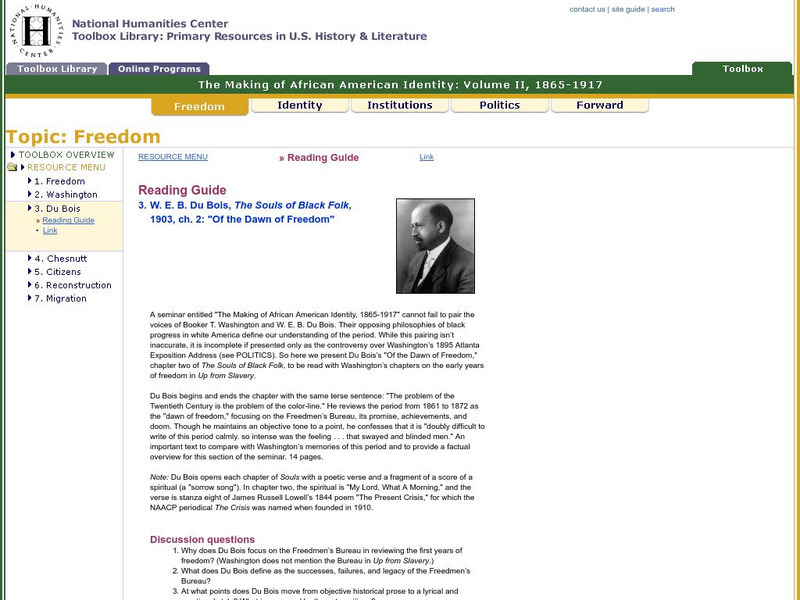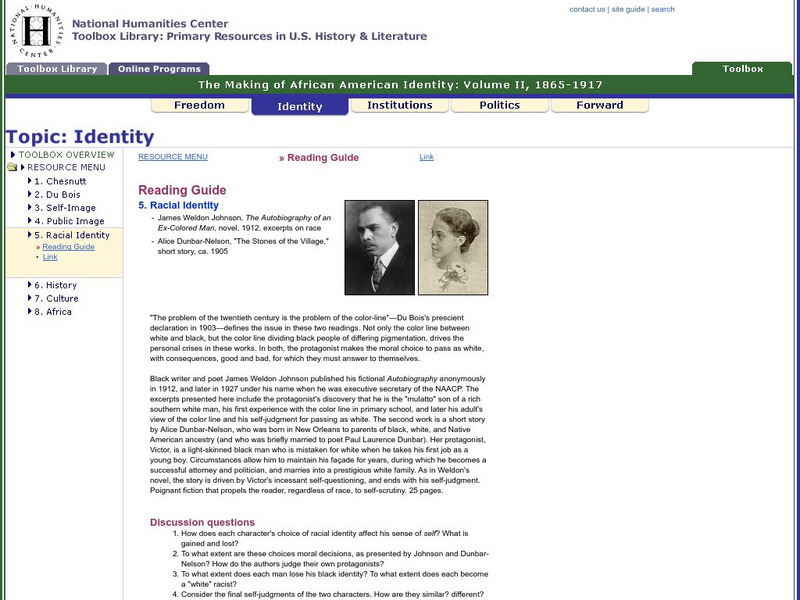National Humanities Center
National Humanities Center: Toolbox Library: Making It, Making of African American Identity: V. 3
Excerpts from a novel and an interview that illustrate where the success of the civil rights movement left some middle class African Americans. They explore the obstacles the civil rights movement had to overcome and the movement's...
National Humanities Center
National Humanities Center: Toolbox Library: Petitions, Making of African American Identity: V. 1
Three late-eighteenth-century petitions to state legislatures and one to Congress by enslaved or free African Americans seeking civil liberties. These four petitions, called "memorials", present a range of origins, goals, and outcomes.
National Humanities Center
National Humanities Center: Toolbox Library: Reconstruction: African American Identity: 1865 1917
An interview, government reports, two paintings, and a work song that explore the constraints placed upon African American freedom in the late-nineteenth century as a result of reconstruction.
National Humanities Center
National Humanities Center: Toolbox Library: Global Community, Making of African American Identity: V. 3
On February 16, 1965, in Rochester, New York, Malcolm X delivered a speech that placed African American in a global black community. Just five days before his assassination, he relates the American civil rights movement to similar...
National Humanities Center
National Humanities Center: Toolbox Library: Leadership, Making of African American Identity: V. 2
Essay in which W. E. B. Du Bois discusses the need for a black elite. This essay, "The Talented Tenth" is provided, illustrating his efforts to improve the social standing of African Americans.
National Humanities Center
National Humanities Center: Toolbox Library: 1913: Fifty Years, Making of African American Identity: V. 2
A poem, an address, and a blues song that express black life in the first fifty years after the Emancipation Proclamation. The texts examine whether the true meaning of the proclamation carried forward to the lives African Americans.
National Humanities Center
National Humanities Center: Toolbox Library: Two Views, Making of African American Identity: V. 2
Two poems that explore the struggles of African Americans in the early-twentieth century. Links to both poems by Fenton Johnson are provided, and illustrate the struggles experienced as black man in white America in the 1910s
National Humanities Center
National Humanities Center: Toolbox Library: Making of African American Identity: Chicago Riots
An analysis of the 1919 Chicago race riot and a description of African American life in Chicago. One analysis is provided by Charles Johnson, editor of the Urban League's magazine Opportunity, describing the problems that beset black...
National Humanities Center
National Humanities Center: Toolbox Library: Making of African American Identity: New Consciousness
Alain Locke's essay, "Enter the New Negro," is provided within this site and describes a new African American sense of self, inspired by migration to the urban North.
National Humanities Center
National Humanities Center: Toolbox Library: Making of African American Identity: Painting the Migration
Paintings by Jacob Lawrence titled, "The Migration of the Negro", a series of sixty paintings, illustrates the migration of African Americans to the North in the twentieth century. A link to this artwork can be found within this summary.
National Humanities Center
National Humanities Center: Toolbox Library: Image of Community, 1968, Making of African American Identity: V.
This article describes the history associated with the sculpture Black Unity, an image of African American community in 1968 by Elizabeth Catlett.
National Humanities Center
National Humanities Center: Toolbox Library: Emancipation: Liberia, Making of African American Identity: V. 1
Primary resource provides letters, statements, and photographs of free and enslaved African Americans who journeyed to Liberia to establish new lives and identities. Also includes questions for class discussion.
National Humanities Center
National Humanities Center: Toolbox Library: Connecting: Making of African American Identity: V. 3
An article that makes a case for black engagement with the American political system. This resource provides a link to Bayard Rustin's "From Protest to Politics", where he encourages African Americans to begin a "revolution through the...
National Humanities Center
National Humanities Center: Toolbox Library: Making of African American Identity: The Blues
Examples of the blues inspired by the African American migration to Northern cities. These lyrics and audio clips explores the reasons for, and effects of, these migrations.
National Humanities Center
National Humanities Center: Toolbox Library: Asking, Making of African American Identity: V. 3
Attempts by African Americans to petition for their civil rights are described within this resource. This include attempts by the black citizens of Charleston to ask for civil rights by petition rather than demand them with protest.
National Humanities Center
National Humanities Center: Toolbox Library: Boycotting, Making of African American Identity: V. 3
A memoir describing the 1955 Montgomery bus boycott by Jo Ann Gibson Robinson titled, "The Montgomery Bus Boycott and the Women Who Started It." This text describes the importance of African American women in initiating the well-known...
National Humanities Center
National Humanities Center: Toolbox Library: New Hope?, Making of African American Identity: V. 3
An article that critiques the early civil rights efforts of the Kennedy administration. It explores the obstacles the civil rights movement had to overcome and the movement's effect on the lives of African Americans.
National Humanities Center
National Humanities Center: Toolbox Library: From Negro to Black, Making of African American Identity: V. 3
A painting that expresses the darkening hopes of the civil rights movement. It explores the obstacles the civil rights movement had to overcome and the movement's effect on the lives of African Americans.
National Humanities Center
National Humanities Center: Toolbox Library: Soul, Making of African American Identity: V. 3
An article that expresses the late 1960s disillusionment of the civil rights movement. It explores the obstacles the civil rights movement had to overcome and the movement's affect on the lives of African Americans.
National Humanities Center
National Humanities Center: Toolbox Library: Dubious Victory, Making of African American Identity: V. 3
An article that describes the price paid by African Americans for school desegregation. The story of six-year-old Tracy Price Thompson is described and link to her memoir is provided.
National Humanities Center
National Humanities Center: Toolbox Library: The Institution, Making of African American Identity: V. 1
Interviews from the 1930s that reflect on African Americans' experience of the institution of slavery. A narrative with firsthands accounts is linked within this resource.
National Humanities Center
National Humanities Center: Toolbox Library: The Moment of Freedom: Making African American Identity
For the four million newly emancipated persons, the transition from slavery to freedom was a defining moment of their lives?although not always apparent at the time. This resource provides texts that explore what freedom meant to African...
National Humanities Center
National Humanities Center: Toolbox Library: W. E. B. Du Bois, Making of African American Identity: V. 2
Chapter in which W. E. B. Du Bois examines the state of African Americans between 1861 and 1872. He reviews the period from 1861 to 1872 as the "dawn of freedom," focusing on the Freedmen's Bureau, its promise, achievements, and doom.
National Humanities Center
National Humanities Center: Toolbox Library: Racial Identity, Making of African American Identity: Vol 2, 1865 1917
A chapter from a novel and a short story that explore the phenomenon of passing. These works examine the self-judgment and scrutiny often invoked upon oneself as a result of belonging to more than one race.


